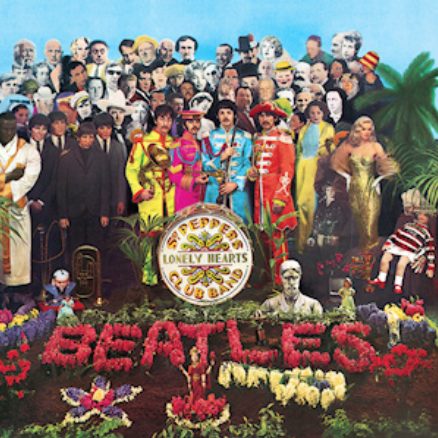
Raising the Bar: Life in a Spanish village
August 10, 2017
Spanish Immigration: Theater of the ultra absurd
October 31, 2017Fifty years ago this summer, the Sgt. Pepper’s LP from the Beatles was taking the world by stereophonic storm. The album defined one generation, and left its massive kaleidoscopic footprint on those to follow. It continues to capture my imagination, and in the spirit of Joseph Campbell, I see and hear undercurrents of the hero’s journey written all over it. No wonder it’s appeal has proven timeless, if not universal. Like a Mesopotamian legend or a German fairy tale, the Beatles spin a tale that resonates deeply in the human psyche.
The album opens with great fanfare and mock bombast, announcing a performance of exceptional proportions, presaging a bona fide epic of the most self-conscious variety. At the end of this quick and rowdy Sgt. Pepper preamble, the band introduces the body of the opus, and day breaks—for the first time—on a perfectly ordinary character. Ringo gives voice to a sanguine but unenlightened optimist who gets by (and high) with a little help from his friends. Like the rest of us, he just wants somebody to love. Here we have the archetypal everyman, the quintessential fool, on the cusp of a hero’s journey. He has been chosen, and so he accepts the call.
Track three opens with a mesmerizing melody on the organ, and we immediately sense a shift from the ordinary to the surreal. Lucy in the Sky with Diamonds, like a hot dose of LSD, opens up a whole new world of “plasticine porters and looking glass ties.” One pill makes you larger, one pill makes you small, and down the rabbit hole we go. “Head in the clouds, and he’s gone.” We have crossed the point of no return and the hero is well on his way, to follow that quest, wherever it may lead.
From there, a burst of bright guitar chops launches us into the next level of optimism, where things truly are “Getting Better” all the time. No more angry young man, no more “hiding me head in the sand”, it’s time to for a complete change of scene and a total psychological overhaul. We have turned a corner, and the upward spiral continues. The hero charges onward, with the proverbial treasure fixed in his crosshairs.
The hero’s and the listeners’ eyes and ears are wide open now. The rabbit hole is the new normal, and we are ready for anything. Cue the harpsichords! Time to fix that hole and “keep my mind from wandering.” The imagination runs wild and “a number of things that weren’t important yesterday” come to the fore. Here the unconscious self breaks through the surface and the old habits are cast away. Indeed, the hole cannot be fixed, and so the mind is flooded with new perspectives and revelatory ideas.
With these fresh insights, both psychic and psychedelic, the old paradigm is no longer tenable. The hero resorts to drastic measures, and “at 5 o’clock as the day begins” and the harp strums softly in the background, we turn away finally from family and tradition. “She’s Leaving Home” and she’s not looking back. McCartney recounts her exodus in excruciating, tear-jerking detail. It’s a story as old as the pentatonic scale, of a young woman yearning to be free, and her parents—concerned but distant—who have absolutely no idea how it happened. “What did we do that was wrong?”
Side one draws to a close and we are off, with our frisky young runaway, to where else, but the circus. “For the benefit of Mr. Kite, there will be a show tonight.” Meanwhile, the multitrack recording performs its own dizzying array of acrobatics. Up and down, backward and forward, and hats off to the maestro producer, engineer and ringmaster, George Martin, aka the Fifth Beatle, for “their production will be second to none.” And after an all-out three ring circus of lyrical imagery and orchestral gymnastics, the record needle drifts obliviously into the vinyl’s inner groove.
Flipping the disc to side two, we ascend even greater heights. No more simple adolescent rebellion and horses dancing the waltz. The time has come for a spiritual awakening. Look into the void and let Harrison’s hypnotizing sitar carry you into that space where all things are one and separation is utter illusion. One of only two songs to clock in over five minutes, “Within You and Without You” transports all those with eyes to see and ears to hear to a realm beyond this mundane material place. To the frustration of Lennon and McCartney perhaps, it is under George’s aegis that the most precious kernel of enlightenment truly crystallizes. Here, among a rich, mysterious tapestry of exotic scales and eastern rhythms, the hero finds his treasure and discovers “a love [that] can change the world. . . If they only knew!”
When the victor returns from this ethereal dominion, he is greeted by a cheerful clarinet, Paul’s soothing voice, and a newfound willingness to accept old age and mortality. Will you still be there with me, “When I’m sixty-four”? The earlier optimism presses on, but now it carries the wisdom and foresight that was absent before. Knitting sweaters and Sunday drives: the promise of life’s simple pleasures rings as true as Ringo’s mighty cowbell.
The hero has captured the gold, and now it’s time to rescue the princess. Or is it the princess who will rescue him? What difference does it make when we are all one and life goes on within us and without us? The princess after all, is none other than “Lovely Rita”, a lowly meter maid on the outside, but a goddess and savior on the inside, worthy of John’s howling praise and panting paeans. She even picks up the bill after dinner.
“Nothing has changed, it’s still the same,” and yet everything has changed when the quest is complete and the hero returns, amidst sizzling guitar riffs, crashing cymbals and a riot of barnyard animals who greet the day. For at least the third or forth time, our epic protagonist wakes up and bids “Good Morning” to the world. But now he looks on the world with a fresh pair of eyes. He has come full circle, and the world looks to him for answers. And it’s the same solution we’ve heard a hundred times before: there is “Nothing to do. It’s up to you. Nothing to say, but it’s ok.”
Finally, as the dogs, cats, lions and roosters stir up a commotion, and a horse gallops into the distance, Sgt. Pepper’s band returns with a reprise of their introductory anthem. Thanks are issued, and the audience roars with applause. The saga closes, save for the cataclysmic coda, “A Day in the Life”, in which we return to the mundane, witness the tragic, and wake up one last time. “Woke up, got out of bed…” and barely made it to work on time. But then, amidst the monotony, the death and the decay, we “slip into a dream”. The orchestra rises to climatic heights, then crashes and fades slowly back into the void.
The day is done and the cycle is complete. From birth, to death, to rebirth; from acceptance, to rejection, to acceptance; we are all one. And life goes on, always revolving, ever forward, sometimes back. And that’s the news today. Oh boy.






1 Comment
Truly enjoyed your Sgt. Peppers Lonely Hearts Band insight. I’m an old lady (older than your mom by several years) but was glad for the clarification (or, at least your definition) of this “story” from the Beatle’s. Thank you.